|
|
|
Sort Order |
|
|
|
Items / Page
|
|
|
|
|
|
|
| Srl | Item |
| 1 |
ID:
130613
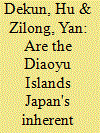

|
|
|
|
|
| Publication |
2014.
|
| Summary/Abstract |
"Historians believe that historical essays have nothing to do with the science of history and are actually harmful. Indeed, authors of such essays, whether intentionally or unintentionally, leave traces of themselves and their time. The same is true of editorials and reviews found in today's newspapers." ' The Origins of the Japan-China Territorial Issue, a new book by Mr. Murata Tadayoshi, an honorary professor at Japan' s Yokohama National University is also an example of what the Contemporary Historian, Mr. Chen Yinke, was referring to in the above. It is common knowledge that after Japan's Noda cabinet adopted its "nationalization" policy over the Diaoyu Islands on September ll, 2012, the Sino-Japan relationship began a downward spiral, while rivalry between non-govemment groups from both nations escalated. The Diaoyu
Islands dispute has become a hot topic for both the media and academia. Among the many works on the topic, Professor Murata's is quite unusual. While tensions remain high between China and Japan, his book carries an impressive argument as shown by work's subtitle-FaZsz?ed Facts in Japanese Government Papers. The cover of the book also features the question--"Are the Diaoyu Islands an inherent part of Japan's territory?"
|
|
|
|
|
|
|
|
|
|
|
|
|
|
|
|
| 2 |
ID:
131416


|
|
|
|
|
| Publication |
2014.
|
| Summary/Abstract |
The two-centuries-old hegemony of the West is coming to an end. The 'revolutions of modernity' that fuelled the rise of the West are now accessible to all states. As a consequence, the power gap that developed during the nineteenth century and which served as the foundation for a core-periphery international order is closing. The result is a shift from a world of 'centred globalism' to one of 'decentred globalism'. At the same time, as power is becoming more diffuse, the degree of ideological difference among the leading powers is shrinking. Indeed, because all Great Powers in the contemporary world are in some form capitalist, the ideological bandwidth of the emerging international order is narrower than it has been for a century. The question is whether this relative ideological homogeneity will generate geo-economic or geopolitical competition among the four main modes of capitalist governance: liberal democratic, social democratic, competitive authoritarian and state bureaucratic. This article assesses the strengths and weaknesses of these four modes of capitalist governance, and probes the main contours of inter-capitalist competition. Will the political differences between democratic and authoritarian capitalists override their shared interests or be mediated by them? Will there be conflicting capitalisms as there were in the early part of the twentieth century? Or will the contemporary world see the development of some kind of concert of capitalist powers? A world of politically differentiated capitalisms is likely to be with us for some time. As such, a central task facing policy-makers is to ensure that geo-economic competition takes place without generating geopolitical conflict.
|
|
|
|
|
|
|
|
|
|
|
|
|
|
|
|
| 3 |
ID:
134136
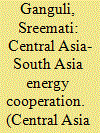

|
|
|
|
|
| Publication |
2014.
|
| Summary/Abstract |
This article focuses on India's energy security demands, as well as the energy security scenario of its immediate neighbors, mainly Pakistan and Afghanistan, and of its strategic neighborhood, i.e. the Central Asian countries. It attempts to concentrate on the factor of energy interdependence among these countries and argues that the possibility of an interregional energy cooperation mechanism is essential for energy security, and ultimately, stability in the wider region. A concept of interregional cooperation based on interdependence is vital for security in the broad sense of the term. These two neighboring regions do enjoy energy interdependence. The wider region has all three ingredients of the energy supply chain-the Central Asian countries as producers, Afghanistan and Pakistan as both transit and market states, and India as the market to make this cooperation feasible. But there has scarcely been any serious effort to put this energy chain into a meaningful dependency variable. For both regions, the other always seems too distant, either as a source or as a market. The continuing insecurity in Afghanistan and bilateral distrust between India and Pakistan are two of the major factors that always put energy relations between Central and South Asia on the backburner. But future prospects may not be so bleak, since the changing security scenario in Afghanistan calls for greater regional economic cooperation, which will be beneficial for Afghan economic reconstruction. More important, it will make the regional states shareholders not only in the Afghan reconstruction process, but also in ensuring greater interregional cooperative mechanisms as well. It is widely believed that energy as a product is a factor of geopolitical and geo-economic conflicts the world over, and there is also plenty of supporting evidence. This article, on the other hand, focuses on the potential of using energy as a vector of alliance in the regional and interregional context.
|
|
|
|
|
|
|
|
|
|
|
|
|
|
|
|
| 4 |
ID:
144305


|
|
|
|
|
| Summary/Abstract |
We analyze the driving forces behind China's New Silk Road (NSR) initiative and find that they include not only short-term factors, such as the US “rebalance” of forces in Asia and China's economic slowdown since 2012 but also long-term factors such as China's ambition to recover its past glory and integrate itself still further into the global economy. We then look at the external challenges facing China's initiative, such as geopolitical competition, fear of overdependence, and political instabilities along the old silk routes. We highlight China's policy dilemmas and discuss the sustainability of China's NSR initiative and its implications for the world. Our conclusion is that China's initiative could be in for a rocky road, but if it strikes a good balance between its diplomatic objectives and means and its values and actions, the NSR could speed up regional integration.
|
|
|
|
|
|
|
|
|
|
|
|
|
|
|
|
| 5 |
ID:
128395


|
|
|
|
|
| Publication |
2014.
|
| Summary/Abstract |
Most everyone has heard of the South China Sea debate, the enduring argument between China and most every other state that has a coastline on that waterway. From Indonesia to the Philippines, every state is angry with China over its claim that it maintains full ownership rights to nearly all of the sea's islands and resources.
|
|
|
|
|
|
|
|
|
|
|
|
|
|
|
|
| 6 |
ID:
114339
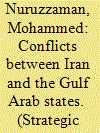

|
|
|
|
|
| Publication |
2012.
|
| Summary/Abstract |
The post-2003 Persian Gulf sub-region has witnessed intensified geopolitical conflicts and competition between Iran and the Gulf Arab states, particularly between Iran and Saudi Arabia. Scholars and experts have mostly analysed the conflicts through political and strategic prisms while neglecting their economic dimensions. This article analyses the various post-2003 conflicts between Iran and the Gulf Arab states with a focus on how economic integration or the lack thereof creates the incentives to resolve or sustain the conflicts. It concludes that low levels of trade and economic integration and the absence of an economics of cooperation between Iran and its Gulf Arab neighbours inhibit any strong initiatives to resolve the conflicts.
|
|
|
|
|
|
|
|
|
|
|
|
|
|
|
|
| 7 |
ID:
122780
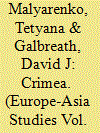

|
|
|
|
|
| Publication |
2013.
|
| Summary/Abstract |
While the breakup of Yugoslavia produced divided loyalties and competing claims, leading to the establishment of seven separate states ending with the de facto independence of Kosovo, Crimea was a source of geopolitical instability that threatened to engulf the region in ethnic and geopolitical conflict. As a result of the negotiations during the 1990s and a de facto settlement between Slavs and the Ukrainian state, between Slavs and returning Crimean Tatars, and between Ukraine and the Russian Federation, Crimea has remained a peaceful and even increasingly wealthy area of Ukraine. Reflecting on the case of Kosovo, this paper looks at the prospect for a similar conflict in and over Crimea. Our primary question concerns the degree to which the Kosovo case sheds light on a somewhat similar case of co-ethnics, religious differences and a weakened state. We argue that the greatest source of instability lies not with ethnic claims or geopolitics, but with Ukrainian political and commercial interests that threaten the de facto settlement between the region and the centre.
|
|
|
|
|
|
|
|
|
|
|
|
|
|
|
|
| 8 |
ID:
128259
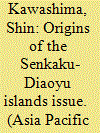

|
|
|
|
|
| Publication |
2013.
|
| Summary/Abstract |
Although news accounts cover the Senkaku/Diaoyu Islands issue, rarely is historical background given. This article focuses on Taiwanese diplomatic documents dating from after World War Two through the early 1970s, the period before Japan-China diplomatic relations were normalized, to try to clarify the timeline of when the Senkaku/Diaoyu Islands became a diplomatic issue.
|
|
|
|
|
|
|
|
|
|
|
|
|
|
|
|
| 9 |
ID:
132024
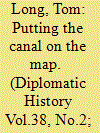

|
|
|
|
|
| Publication |
2014.
|
| Summary/Abstract |
In the early 1970s, Panama's negotiations with the United States over the status of the Panama Canal ground to a standstill. General Omar Torrijos had rejected treaties left unratified by previous governments only to receive a less generous offer from the Nixon administration. Realizing that the talks were being ignored in Washington, the Panamanian government worked to internationalize the previously bilateral issue, creating and exploiting a high-profile forum: Extraordinary meetings of the UN Security Council in March 1973 held in Panama City. In those meetings, Panama isolated the United States in order to raise the issue's profile and amplify the costs of leaving the matter unsettled. Using underutilized Panamanian sources, this article examines that meeting, the succeeding progress, and the effect of this early stage on the final negotiations several years later. The case also illustrates how, during the unsettled international environment of the 1970s, a small state utilized international organizations to obtain attention and support for its most important cause.
|
|
|
|
|
|
|
|
|
|
|
|
|
|
|
|
| 10 |
ID:
121510


|
|
|
|
|
|
|
|